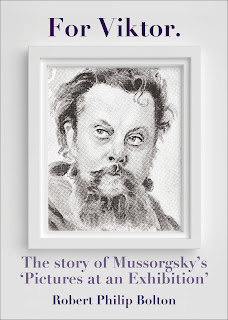Maestro Ashkenazy is an acknowledged expert
on Russian music. He has recorded Mussorgsky's Pictures at an Exhibition twice
and has created his own orchestration of the suite which he has recorded with
the Philharmonia Orchestra as well as conducting its performance with other
orchestras all over the world.
Here's what he said about For Viktor.
What Vladimir Ashkenazy said about ‘For Viktor’
Dear Mr Bolton,
I read your book For
Viktor. The Story of Mussorgsky's 'Pictures at an Exhibition' with great
interest and satisfaction. I think it is very important to try to bring school
children to a certain level of appreciation and understanding of what great
music of the great composers brings to all of us. I know of numerous examples
of how children react being exposed to well presented lessons based on this
kind of music and the results are absolutely astounding; apart from the fact
that as they grow up they almost never abandon their affection for the serious
music, they perform much better in all other subjects of their curriculum than
those children who were not exposed to the same musical appreciation program. I
know first hand of these examples in many countries - from the U.K. to Russia -
having been a part of such programs.
I think your very well presented book on
'Pictures' could be a wonderful item in such a curriculum and I think you
should endeavour in presenting it to various educational institutions in your
country. I'll be delighted to be of help when needed and send you all my best
wishes.
Sincerely
(Signed)
Vladimir Ashkenazy
About For Viktor
Based on fact, and historically accurate, For Viktor is written in Modest Mussorgsky’s own voice as he guides a young companion around the picture exhibition held in honour of his friend Viktor Hartman at the Academy of Artists in Saint Petersburg, Russia, in 1874. It was this exhibition which inspired Mussorgsky to write the suite of music he called ‘Pictures at an Exhibition’.The book is written to be read or delivered in time with the playing of the music. The duration of each section — including each of the promenades — is about the same as the musical piece it describes. Indeed, important events in the narrative often intersect with appropriate moments in the music to bring the unseen pictures to life.
It is indeed a unique meeting of art, music and literature.
